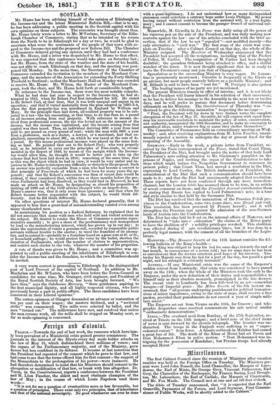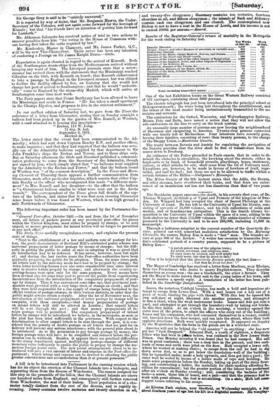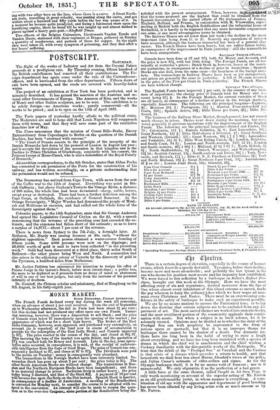Yitiortllattuus.
The first Cabinet Council since the reunion of Ministers after vacation rambles was held at the Foreign Office. on Tuesday. The Ministers pre- sent were Lord John Russell, the Lord Chancellor, the Marquis of Lans- downe, the Earl of Minto, Sir George Grey, Viscount Palmerston, Earl Grey, the Chancellor of the Exchequer, Sir Francis Baring, Lord Brough- ton, Mr. Labouchere, the Earl of Carlisle, the Marquis of Clanricarcle, and Mr. Fox Maule. The Council met at one and sat till four o'clock.
The Globe of Tuesday announced, that "it is expected that the Earl Granville, Paymaster of the Forces, and Lord Seymour, First Commis- sioner. of Public Works, will be shortly added to the Cabinet." Sir George Grey is said to dse "entirely recovered."
It is reported by way of feeler, that Mr. Benjamin Ewe% the Under. Secretary of the Colonies, will pot again come forward for the borough.of Kinsale • but that " his friends have an Intention of putting'him forward for Lambeth."
Mr. Alderman Salomehs has received notice of trial in two actions to recover penalties from him "for voting in the House of Commons with- out having first taken the oaths required Isy law."
Mr. Kindereley, Master in Cbencery, and Mr. James Parker, Q.C., • will be the neiv Vice-Chancellors. There never has been any intention of oonforriog Peerage on Sir Jag= .pight Brime.—Globe.
Expectation issegain cheated in regard to the arrival of Kossuth. Both of the Southampton steam-ships from the Mediterranean arrived without bringing any word of him. The Liverpool journals state that a screw- steamer has arrived there with the statements that the Mississippi reached Gibraltar on the 10th, with Kossuth on board; that Kossuth endeavoured to take a passage to England in the l.isrerpool steamer, but was obliged to decline the facility offered by her, on learning that she would not change her port of arrival to Southampton ; and that he would" undoubt- edly' come to England by the steam-ship Madrid, which will arrive at Southampton some time next week.
The Paris papers state that Count Batthyany has been allowed to leave the Mississippi and reside in France. "He has taken a small apartment in the Champs Elysdes, and proposes to live in the strictest retirement."
In our earliest edition of Saturday last, we gave from the Times the substance of a letter from Gloucester, stating that on Sunday sennight a balloon bad been picked up in the .garden of Mrs. Russell, at Wootten, with a card attached to it bearing this inscription—
Erebus, 112 W. Long. 71 deg. N. Let. September 3, WI, Blocked in."
The letter stated that the event had been communicated to the Ad- miralty; which had sent down Captain Beechy R.N. and another officer, to make inquiries ; and that they had reported that the balloon was actu- ally one of the Admiralty balloons supplied by that department to Sir John Franklin's ships the Erebus and Terror, and to those ships only. But on Saturday afternoon the Globe and &ands:ref published a communi- cation professing to come from the Secretary of the Admiralty, though not signed by him, which simply stated that no balloons were supplied by the Admiralty to the Erebus and Terror," and that the balloon found at Wootten was " of the common description." In the Times and Morn- ing Chronicle of Thursday there appears a further communication from Gloucester, made after paiticular inquiries, which asserts that either Cap- tain Beechy or the officer who accompanied him made "a different state- ment" to Mrs. Russell and her daughter—to the effect that the balloon is "a Government balloon similar to what were sent out in the Arctic vessels." The correspondent of the Times gives full details of the cap- ture of the balloon, and states that it was lint seen crossing Gloucester some hours before it was found at Wootten, which is on high ground a mile Northwards of Gloucester.
The following important order has been issued by the Postmaster-Ge- neral.
"General Post-ojice, October 1851.—On and from the 1st of November next, all letters or packets posted at any provincial post-office for places within the United Kingdom, must either be prepaid by stamps, or be sent unpaid, as money prepayment for inland letters will no longer be permitted at any such office."
The Daily News usefully recapitulates events, and explains the present state of things.
"Next to the establishment of a low and uniform rate of postage for let- ters, the great characteristic of Rowland Hill's celebrated postal scheme was universal prepayment of letter postage by means of stamps ; but the diffi- culty in getting the public to want at once in adopting it was so great that its introduction had to be deferred. It has never, however, been lost sight of; and during the last twelve years the Post-office authorities have been gradually preparing the public for its adoption. Thus, for some years past, all letters sent by the mid-day mails have had to be prepaid by stamps ; the town letter receiving-houses were also some considerable time since allowed only to receive letters prepaid by stamps; and afterwards the country re- ceiving-houses were open only for the same purpose. Every means have been devised also for some time past to prevent the public from experiencing inconvenience from the introduction of the compulsory prepayment of post- age by stamps. Thus it was announced sometime ago, that provincial post- masters were provided with a very large stock of stamps on credit. and that they were held responsible for a due supply of stamps being furnished to the official vendors of postage-stamps, in their various districts, in order that the public might always obtain a supply. After the 1st of November next, the introduction of the universal prepayment of letter postage by stamps will be complete, with these exceptions,—that money prepayments of postage on inland letters will still be allowed in London ; that unpaid letters will be sent through the post ; and that money prepayments of fo- reign postage will be permitted. The compulsory prepayment of inland letters by stamps will be introduced, we believe, in the metropolis, as soon as the plan has been tried sufficiently in the provinces. With respect to the determination to allow unpaid letters to be sent through the post, it is con- sidered that the penalty of double postage on all letters that are paid for on delivery will prevent any serious interference with the general plan about to be introduced. As to the permission to pay foreign postage by money, the foreign postage rates will have to be simplified and reduced before the per- mission can be withheld. Besides, it appeal.* there are practical difficulties in the stamp department against multiplying postage-stamps of different monetary value sufficiently to enable the pubhc to prepay by stamps the nu- merous foreign postal rates. The new postal arrangements about to be in- troduced will save a vast amount of labour and expense in the Post-office de- partment; which labour and expense can be devoted to affording the public greater conveniences and accommodation than it at present possesses.'
A bill is to be introduced into Parliament in the ensuing session which has for its object the erection of the Channel Islands into a bishopric, and separating them from the diocese of Winchester. The reason assigned for this step in the preamble of the bill is, that the Channel Islands are above one hundred miles from England, and consequentiy still further removed from Winchester, the mat of their bishop. Their population is of a cha- racter totally distinct from the rest of the diocese, and is rapidly in- creasing. Jersey contains twelve rectories and twenty churches in all, and twenty-five clergymen ; Guernsey contains ten rectories, fourteen churches in all, and fifteen clergymen ; the islands of Sark and Alderney contain each one clergyman and one ,church, The contemplated new Bishop is not to have a seat in the House of Lords, and his income is not to exceed 2000i. per nanum.—liseortl.
Results of the Registrar-General's return af mortality in the Metropolis for the week ending on Saturday last.
Zymotie Diseases I,. 1•■• • • • 2,329 ,.....,
Dropsy, Cancer, and other diseases of uncertain or variable seat, . 506 ....
Diseases of the Bruin, Spinal Marrow, Nerves, and mama 11351 :::: 173
Tubercular Diseases Diseases of the Heart and Blood-vessels 44 Diseases of the Lungs, and of the other Organs of Respiration LON lii Diseases of the Stomach, Liver, and other Organs of Digestion .., 595 72 Diseases of the Kidneys, he 101 16
Childbirth, diseases of the Uterus, he 108 10 Rheumatism, diseases of the Bones, Jointl,he 07 a Diseases of the Skin, Cellular Tissue, hex. 9 1
Malformations as 3 Premature Birth 233 35 Atrophy 192 20 AIM 468 33
Sudden •■••• 87 •i.• 7
Violence,Privatiou.,Ckdd, andLatemperance 21631 Total (*eluding ottspeeiied Mises) 2,220 953
One of the last Exhibition trains on the Great Western Railway contested of 151 carriages, containing about 5000 persons. The electric telegraph has just been introduced into the principal school at Iiishopeweiumouth ; the wires being laid throughout the establishment, and the orders of the head master being instantaneously transmitted to the as- sociates and servants.
The contractors for the Oxford, Worcester, and Wolverhampton Railway, Messrs. Pete and Betts, have issued a notice that they will not allow the sub-contractors on the line to carry on the truck system.
An unusually large number of persons are now leaving the neighbourhood of Sheerness and emigrating to America, Twenty-four persona connected with one family left at Miebaelmae. Four labourers have recently gone, leaving their families, consisting of more than twenty persons, to the charge of the Sheppy Union.—.Maidstone Gazette.
The treaty between Bavaria and Austria for regulating the navigation of the Danube provides that the river 4411 be free of transit-dues from its source down to Freeburg.
An ordinance of the Police placarded in Paris enacts, that in order to di- minish the obstacles to circulation, the hawking about the streets, either in hand-carts or by hand, of household utensils, playthings, boxes, stationery, cutlery, or other articles for sale, shall cease from the 1st of February next. Exceptions are, however, to be made in favour of hawkers of fruit, vege- tables, and turf for fuel ; but these are not to be allowed to traffic within IS certain distance of the Halles.—Galignanis Messenger.
The Milan Gazette of the 6th instant states that the Adds, the Brenta, and other streams, have overflowed their banks, and that fears are enter- tained of an inundation not less nor less disastrous than that of two years ago.
The Stockholm papers announce the death, in his seventy-first year, of Dr. Thomas Wins,eard, Archbieft p of Upsal and Primate of the kingdom of Swe- den. Dr. Wingard had long occupied the chair of Sacred Philology at the University of Lund. He has left to the University of U_psal his library, con- sisting of upwards of 34,000 volumes, and his rich collections of come and medals, and of Scandinavian antiquities. This is the fourth library be- queathed to the University of Upsal within the space of a year, adding to its book-shelves no fewer than 115,000 volumes. The entire number of volumes possessed by the University is said to be now 288,000, including 11,000 in manuscript.
Through a ludicrous misprint in the current number of the Quarterly Re- view, pointed out with somewhat malicious satisfaction by the Morning Chronicle, the austere Bishop Ken is made a "fast" man. The blunder oc- curs at page 306 of the Review. "A writer has occasion to transcribe Drys den's celebrated portrait of a country parson, supposed to be a picture of Bishop Ken-
' A parish priest was of the pilgrim train; An awful, reverend, and religious man. Of sixty years he seemed, and well might last To sixty more, but that he lived to fast
"Can it be believed that the Quarterly Review prints the last line— but that he lived too fate: ?" The Mayor of Cambridge Lae received a letter from Mariana, near Rheims, from two Frenchmen who desire to marry Englishwomen. They describe themselves as young menthe one a blacksmith, the other a farmer. They ask the Mayor to make known their suit to the young ladies of his town, and hope to receive a speedy reply. A translation of the letter has been pub- lished in the Cambridge Independent.
Isaacs, the notorious Uekfleld burglar, has made a bold and ingenious at- tempt to escape from Lewes Gaol. With a nail Isaacs cut a key out of a piece of wood, binding the pipe with thread. With this key he opened his own cell-door at night, liberated Ade another prisoner, and attempted to free a third, when the weak instrument broke. Isaacs and Ade got into a yard, and attempted to get through the boundary-wall by taking out bricks. In this they failed. At six o'clock in the morning, a turnkey opened the outer door of the prison, to admit the officers who sleep out of the building; Isaacs and his companion, who had concealed themselves in a coiner, rushed out, knocked down the door-keeper, and ran into the street, where they took opposite directione. Both were quickly recaptured. It appeared on inquiry by the Magistrates that the locks in the prison are in a wretched state. America will not be behind the "old country" in anything : she has now got her "Jack Sheppard." Edmund Holt, a youth of eighteen, a desperate fellow who had been in pigeon before, was confined in the New Jersey State Prison. One Monday morning it was found that he had escaped. His cell was m great confusion ; there was a deep hole in the ground, and two cart- loads of stone and earth were piled on the floor. Holt occupied a lower cell, where he worked at making chairs ; to escape from the cell he had to dig down seven feet, so as to get below the foundation-wall of the build' ; this he tunnelled under, made a hole upwards, and thus got into a yard ; the outer wall he scaled by means of a ladder made of rope and bedding. He made some preparations before the Sunday, taking up part of the stone floor- ing, and constructing a ladder, the materials for chair-making affording fa- cilities for concealment; but the .greater portion of the labour was performed after six o'clock on Sunday evening ; and considering the badness of the tools—a screw, three bits of board, and a pail—and that the prisoner had to work with great silence, the feat is astonishing. On a slate, Holt left some doggrel verses referring to his escape.
At Kiveton Park station, near Sheffield, on Wednesday sennight, a hey about fourteen years of age lost his life in a frightful manner. He was pies-
Ten Weeks Week
of 1841-30. of 1862.
242 45
ing with two other boys on the line, where there is a curve. A Great North- ern train, travelling at great velocity, was passing along the curve, and got within about a hundred and fifty yards before the boy was aware of it. In a moment he became quite paralyzed, and fixing a fascinated stare upon the horrifying engine, there he stood till he was caught up and almost dashed to pieces against a heavy gate-poet.—Sheifietr/ Tines.
Two officers of the Belgian Cuirassiers, Lieutenants Vanden Eynde and Vanden Haute, stationed with their regiment at Bruges, gathered on Sunday a quantity of mushrooms, and partook of them for supper. In the eight they were taken ill, with every symptom of poisoning, and they died after a few hours' suffering.




























 Previous page
Previous page